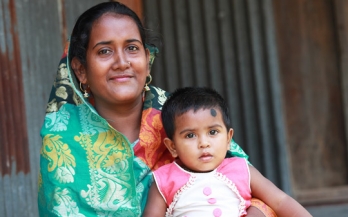The latest nutrition data out of Bangladesh describe a situation brimming with promise. The Bangladesh Demographic and Health Survey (BDHS) 2017/2018 estimates stunting at 31% and the UNICEF Multiple Indicator Cluster Survey (MICS) 2019 shows an even lower estimate of 28%.
The clock is ticking. We are just 10 short months from the Nutrition for Growth Summit (N4G) in Japan in mid-December. Many people are working hard with the Government of Japan and partners, allies and colleagues to energise the nutrition base - and beyond - about the Summit and to develop commitments that will accelerate improvements in nutrition.
We use dietary intake surveys of what people eat a lot. They are needed to support the design, monitoring, and evaluation of food-based nutrition programmes that aim to improve dietary adequacy in populations. In a world where over one third of people have unhealthy diets, getting this right matters.
This month GAIN organised an event, in partnership with the Scaling Up Nutrition Movement (SUN) and the Global Health Centre at the Graduate Institute in Geneva, on urbanisation and nutrition. While there have been some voices calling for these two issues to come together, this has not really happened, although things now seem to be changing.
Has the food and nutrition policy community adapted to the new urban realities and, if not, how should they? This was the topic of the launch of the new IFPRI Global Food Policy Report on urbanisation, food security and nutrition.
At GAIN we strive for sustained impact. Our aim is to improve the consumption of nutritious and safe food for all, especially the most vulnerable. We work hard to make sure our programming, policy and knowledge work form a virtuous circle that generates that impact. Hence, we take knowledge seriously: as producers, but also as consumers. Here is our end-of-year list for the articles, books, blogs, videos and reports that have influenced our thinking this year.
On Sunday 10 November, staff members from GAIN Indonesia received awards from the Surabaya City Mayor for their significant contributions in improving child and maternal nutrition in the city. Despite being the second-largest city in Indonesia with a rapid economic growth of 6% in 2018, Surabaya is not free from malnutrition. As much as 27% of children under five are stunted.
A critical element to improve children’s health and reduce child malnutrition is changing behaviours and practices around maternal and infant nutrition. In Indonesia, mothers are generally aware that exclusive breastfeeding for six months is best for their child, and that they should continue to breastfeed for a further eighteen months with complementary foods.
I go to many meetings where the term "food system transformation" is bandied about. Sometimes the term goes unquestioned - for some people it has entered into the rarefied atmosphere of development jargon. But increasingly (thank goodness) the question is being asked: what does food system transformation mean? So what is the answer?
Pellagra. Beriberi. You likely haven’t heard of these debilitating diseases: they were virtually eradicated more than 70 years ago by adding essential vitamins and minerals to commonly consumed staple foods and condiments. One of the most common forms of fortification, salt iodisation, is now practiced in more than 160 countries and is credited with preventing 750 million cases of goitre over the past 25 years.










